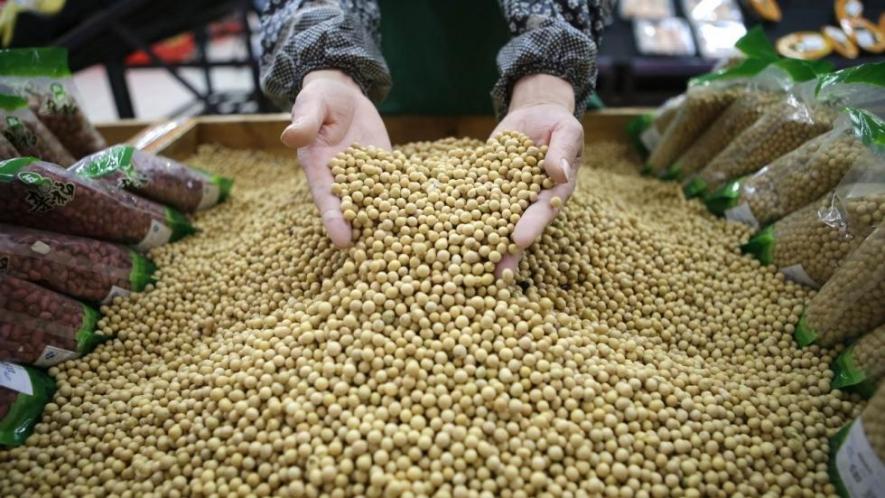GM Seed Use has Surged in India, But With No Better Results

Image for representational use only.Image Courtesy : scmp.com
As an aftermath of the adoption of the liberalisation policy by India in the 1990s, the agricultural sector witnessed steady and significant deviations from its traditional practices. The subsidies on fertilisers, pesticides, water, seeds etc., had been pulled back by Government. The markets that previously catered the public agricultural goods got flooded with new private brands.
Eventually, genetically modified (GM) seeds also made their way into Indian agriculture, with the first foray in cotton. India is the second largest cotton producer in the world and this crop plays a significant role in the industrial and agricultural economy of the country. Cotton is a crop that is extremely pesticide intensive. In the 1990s, when GM seeds were debated, Indian cotton accounted for almost half the pesticide sprayed in the country, whereas cotton was planted in only 5 per cent of the farmlands. GM cotton seeds were argued to reduce the pesticide use. But, over the last decade, cotton production has largely seen a stagnant growth, whereas the pesticide sprays have increased.
Moreover, farmers’ suicide during this period escalated. It was also argued that use of GM seeds would increase the yield and would be able to give respite to farmers, thus reducing the suicide cases.
How GM seeds have escalated in and how it has impacted agriculture has been surveyed in a study by Andrew Flachs of Purdue University, US. His survey was conducted in the Indian state of Telangana, one of the major cotton growers of the country.
Flachs’s survey indicated that there is a surge in the use of GM seeds and this has not apparently changed the plight of the farmers, nor the suicide rates have seen a sharp decline. A government report says that there were 12,500 suicide cases in the year 2015. Flachs argues that the distress of farmers in India is much more complicated an issue to be tackled only through GM seeds.
GM Seeds Create Choice Overload for Farmers
The survey was conducted in Telangana within the period 2012-2016. During the survey, Flachs talked to the members of the households engaged in cotton farming, about their experience with GM cotton seeds and about their decision of purchasing of the GM seeds where markets are flooded with seeds of this kind and is only growing every year.
"Consumer scientists call this 'choice overload.' When you step into a supermarket and there are 70 types of mustard to buy, it becomes a stressful situation and people no longer want to deal with making that decision," said Andrew Flachs in Science Daily. "When genetically modified seeds were first introduced, there were just three seeds. Now, there are more than 1,200 and figuring out which particular seed to buy has become an incredibly difficult and confusing decision."
Also Read: GM Crops: The Societal Context of Technologies
Flachs argues that the choice of purchase of the GM seeds is not based on any rational decision of economic or agricultural prospects; rather it is based on social narratives that reflect local rules, values and expectations. Since 2008, many farmers in the region have chosen one brand of seeds en masse. Some brands, in many cases, are being planted by more than half of the cotton farmers in the region. But in the next year, the same brand seeds may not get their way to the field; farmers replace the previous year’s seeds with some new brand seed. This has paved the way for flourishing of many private brands dealing with GM seeds.
According to Flachs, the justification in favour of the choice for the seeds is largely concentrated on one aspect, “manci digubadi”—a good yield. The urge to have good yield made the cotton farmers try new brand seeds every year. In the absence of any government assistance on the choice of the seeds, farmers usually fall prey to the flashy advertisements and the public opinion generated around it.
The survey finds that the yields of six most popular varieties of seeds during the study period were all within the normal range; even farmers repeatedly abandoned and embraced new seeds. This suggests that the farmers don’t depend on any rational measure that can give any hint about what constitutes a good yield. Moreover, the inherent external variables like that of weather, water, pests, the farmers could never reach their desired potential.
According to Flachs, the best thing Indian policy makers could do to help the farmers is to put a restriction or regulation over the influx of new seeds each season.
"But if we understand this as more of an existential question, then this isn't really about seeds at all. We need to improve the quality of life for Indian cotton farmers, whether that means better roads or more reliable irrigation, both of which are huge problems in India," Flachs is quoted to have said. “Cotton agriculture has grown with the introduction of genetically modified seeds, and people have put a lot of money into growing them, which has created a lot of debt. This is a social problem about justice, not just an agricultural problem about crop pests," he further added.
Get the latest reports & analysis with people's perspective on Protests, movements & deep analytical videos, discussions of the current affairs in your Telegram app. Subscribe to NewsClick's Telegram channel & get Real-Time updates on stories, as they get published on our website.
























